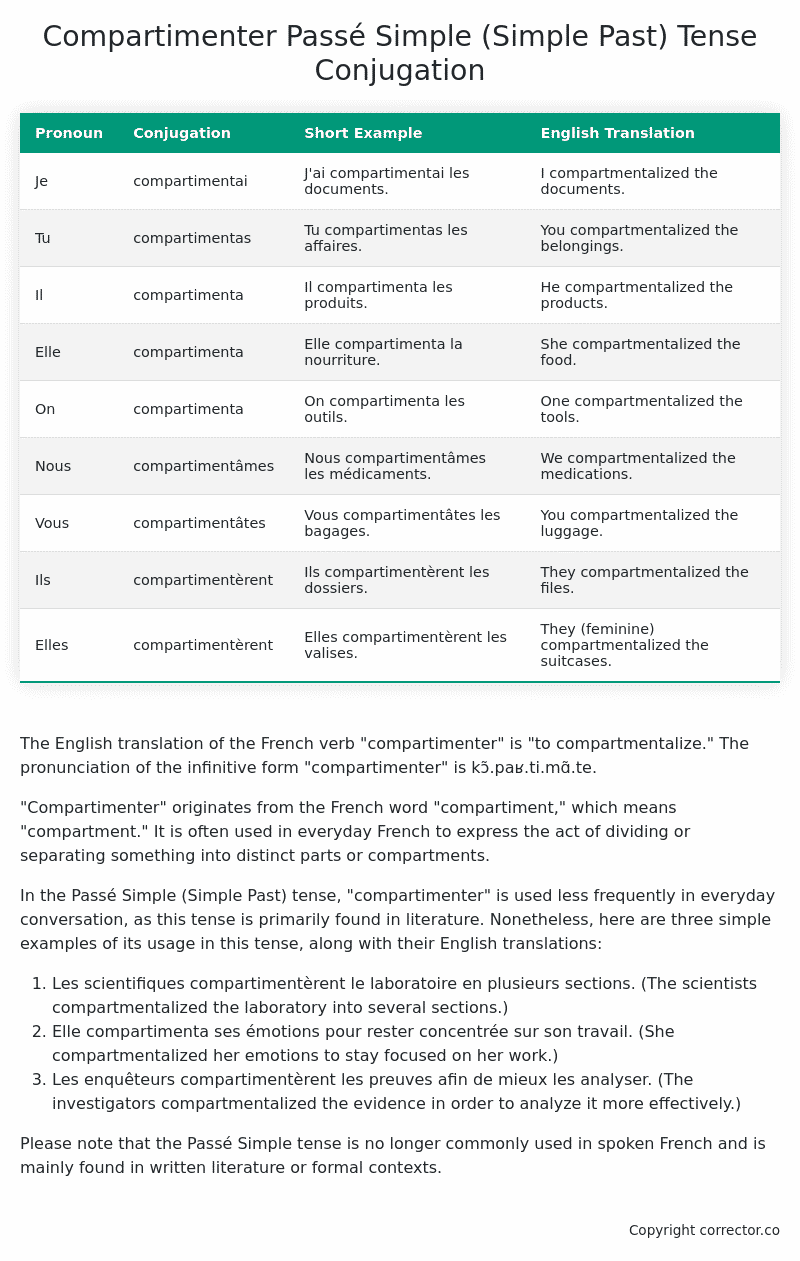Passé Simple (Simple Past) Tense Conjugation of the French Verb compartimenter
Introduction to the verb compartimenter
The English translation of the French verb “compartimenter” is “to compartmentalize.” The pronunciation of the infinitive form “compartimenter” is kɔ̃.paʁ.ti.mɑ̃.te.
“Compartimenter” originates from the French word “compartiment,” which means “compartment.” It is often used in everyday French to express the act of dividing or separating something into distinct parts or compartments.
In the Passé Simple (Simple Past) tense, “compartimenter” is used less frequently in everyday conversation, as this tense is primarily found in literature. Nonetheless, here are three simple examples of its usage in this tense, along with their English translations:
- Les scientifiques compartimentèrent le laboratoire en plusieurs sections. (The scientists compartmentalized the laboratory into several sections.)
- Elle compartimenta ses émotions pour rester concentrée sur son travail. (She compartmentalized her emotions to stay focused on her work.)
- Les enquêteurs compartimentèrent les preuves afin de mieux les analyser. (The investigators compartmentalized the evidence in order to analyze it more effectively.)
Please note that the Passé Simple tense is no longer commonly used in spoken French and is mainly found in written literature or formal contexts.
Table of the Passé Simple (Simple Past) Tense Conjugation of compartimenter
| Pronoun | Conjugation | Short Example | English Translation |
|---|---|---|---|
| Je | compartimentai | J’ai compartimentai les documents. | I compartmentalized the documents. |
| Tu | compartimentas | Tu compartimentas les affaires. | You compartmentalized the belongings. |
| Il | compartimenta | Il compartimenta les produits. | He compartmentalized the products. |
| Elle | compartimenta | Elle compartimenta la nourriture. | She compartmentalized the food. |
| On | compartimenta | On compartimenta les outils. | One compartmentalized the tools. |
| Nous | compartimentâmes | Nous compartimentâmes les médicaments. | We compartmentalized the medications. |
| Vous | compartimentâtes | Vous compartimentâtes les bagages. | You compartmentalized the luggage. |
| Ils | compartimentèrent | Ils compartimentèrent les dossiers. | They compartmentalized the files. |
| Elles | compartimentèrent | Elles compartimentèrent les valises. | They (feminine) compartmentalized the suitcases. |
Other Conjugations for Compartimenter.
Le Present (Present Tense) Conjugation of the French Verb compartimenter
Imparfait (Imperfect) Tense Conjugation of the French Verb compartimenter
Passé Simple (Simple Past) Tense Conjugation of the French Verb compartimenter (You’re reading it right now!)
Passé Composé (Present Perfect) Tense Conjugation of the French Verb compartimenter
Futur Simple (Simple Future) Tense Conjugation of the French Verb compartimenter
Futur Proche (Near Future) Tense Conjugation of the French Verb compartimenter
Plus-que-parfait (Pluperfect) Tense Conjugation of the French Verb compartimenter
Passé Antérieur (Past Anterior) Tense Conjugation of the French Verb compartimenter
Futur Antérieur (Future Anterior) Tense Conjugation of the French Verb compartimenter
Subjonctif Présent (Subjunctive Present) Tense Conjugation of the French Verb compartimenter
Subjonctif Passé (Subjunctive Past) Tense Conjugation of the French Verb compartimenter
Subjonctif Imparfait (Subjunctive Imperfect) Tense Conjugation of the French Verb compartimenter
Conditionnel Présent (Conditional Present) Tense Conjugation of the French Verb compartimenter
Conditionnel Passé (Conditional Past) Tense Conjugation of the French Verb compartimenter
Conditionnel Passé II (Conditional Past II) Tense Conjugation of the French Verb compartimenter
L’impératif Présent (Imperative Present) Tense Conjugation of the French Verb compartimenter
L’impératif Passé (Imperative Past) Tense Conjugation of the French Verb compartimenter
L’infinitif Présent (Infinitive Present) Tense Conjugation of the French Verb compartimenter
L’infinitif Passé (Infinitive Past) Tense Conjugation of the French Verb compartimenter
Le Participe Présent (Present Participle) Tense Conjugation of the French Verb compartimenter
Le Participe Passé (Past Participle) Tense Conjugation of the French Verb compartimenter
Struggling with French verbs or the language in general? Why not use our free French Grammar Checker – no registration required!
Get a FREE Download Study Sheet of this Conjugation 🔥
Simply right click the image below, click “save image” and get your free reference for the compartimenter Passé Simple tense conjugation!

Compartimenter – About the French Passé Simple (Simple Past) Tense
Formation
Usage
Narration
Historical Context
Interactions with other tenses
Passé Composé
Imparfait
Conditional and Subjunctive
Summary
I hope you enjoyed this article on the verb compartimenter. Still in a learning mood? Check out another TOTALLY random French verb conjugation!


